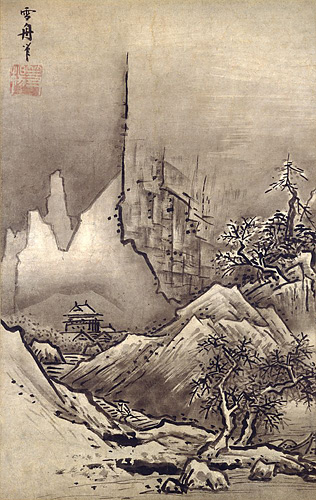| architecture |
| calligraphy |
| ceramics |
| clothing |
| comics |
| gardens |
| lacquerwork |
| literature |
| movies |
| music |
| painting |
| poetry |
| sculpture |
| tea ceremony |
| television |
| theatre |
| weaponry |
| thematic routes |
| timeline |
| the site |
context: painting > Zen painting > Artists > Sesshu

|
Winter |
Sesshu: Landscapes
His main work was always centred on spectacular landscapes characterised by jagged, crackling rocks, limned with lines like lightning strikes. This sort of fits in with rinzai Zen, where enlightenment comes in a sudden flash. Unlike his master Shubun, who moved towards empty space as a subject, Sesshu stepped firmly back to painting monumental masses. Also reacting against Shubun, Sesshu did not stick with the prescribed brushstrokes for each subject, inherited from hundreds of years of Chinese academicising. There is the sense of his looking at the reality with an unflinching eye, but also looking inside himself for the feelings, to find the ways that suited him of depicting his subjects. He rethought the rules, and came up with a bewildering range of brushstrokes to use. He also sometimes did what was very rare then and since in Japanese landscape painting: he painted the work in situ. His speed may have helped here - I've read claims that he once painted a 30' scroll in one day.
My favourite of his works is the one shown here, called Winter (the Autumn on the page up from here is from the same posited set). I think it was the first of his I saw, perhaps even the work that made me fall in love with Japanese painting beyond the Edo printmakers. I still find it jawdroppingly powerful, and I still get a mighty 'what the fuck...?' feeling from the high central line - I guess it's defining an implausibly overhanging cliff, but with its being cut short like that, there's no real way of reading and resolving it. We have the house, that hangover from the scholar's retreat genre (and someone who is probably a scholar in the foreground - easily missed), but the rest looks like nothing on earth, jagged lines, often thick and assertive, defining terrain that has never existed anywhere.
forwards: Two more landscapes
